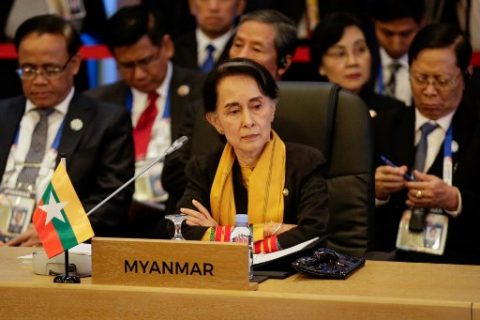
World leaders are in the Philippines for two days of summits. / AFP/
MANILA, Philippines (AFP) — UN chief Antonio Guterres urged Myanmar leader Aung San Suu Kyi to allow Rohingya refugees in Bangladesh to return, when they met Tuesday at a summit in the Philippines, his office said.
The meeting added to global pressure on Suu Kyi to take action to end the crisis for the Muslim minority, with US Secretary of State Rex Tillerson due Tuesday also to hold talks with her in Manila then travel to Myanmar.
“The Secretary-General highlighted strengthened efforts to ensure humanitarian access, safe, dignified, voluntary and sustained returns, as well as true reconciliation between communities, would be essential,” a UN statement said, summarizing comments to Suu Kyi.
More than 600,000 Rohingya have fled to neighboring Bangladesh in two and a half months.
The crisis erupted after Rohingya rebels attacked police posts in Myanmar’s Rakhine state, triggering a military crackdown that saw hundreds of villages reduced to ashes and sparked a massive exodus.
Authorities have blocked independent access to northern Rakhine.
But journalists and UN officials have collected reams of testimony from Rohingya refugees in Bangladesh describing soldiers and Buddhist mobs committing murder, rape and mass arson.
Following its first official investigation into the crisis, the army published a report this week in which it cleared itself of any abuses.
Nobel laureate Suu Kyi, a former democracy activist, has been lambasted by rights groups for failing to speak up for the Rohingya or condemn festering anti-Muslim sentiment in the country.
But she lacks control over the powerful military, which ruled the country for decades until her party came to power following 2015 elections.
The United States has been careful not to place blame on her and has focused instead on the army’s role in the conflict.
Guterres and Suu Kyi met in the early hours of Tuesday morning, according to his office.
In a summit on Monday night with leaders of the 10-member Association of Southeast Asian Nations, of which Myanmar is a member, Guterres also voiced concern about the Rohingya.
He said the displacement of hundreds of thousands of Rohingya was a “worrying escalation in a protracted tragedy,” according to the UN statement.
He described the situation as a potential source of instability in the region, as well as radicalization.
© Agence France-Presse







